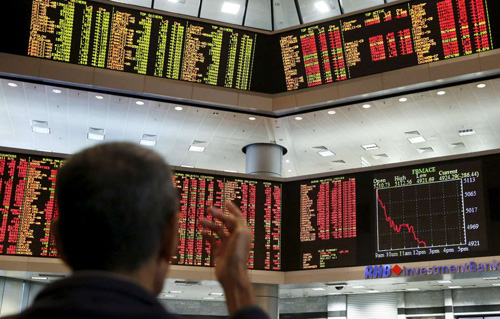
US-China trade war concerns continued to weigh on the Malaysian equities market, in tandem with the global equities market movements, but the trend has shown some positivity with the pace of outflows slowing down, analysts say. — Reuters photo
KUALA LUMPUR: US-China trade war concerns continued to weigh on the Malaysian equities market, in tandem with the global equities market movements, but the trend has shown some positivity with the pace of outflows slowing down.
Bank Islam Malaysia Bhd chief economist, Dr Mohd Afzanizam Abdul Rashid said flows in the equity markets have been gradually dissipating, with the daily average net outflows declining to about RM131 million compared to RM246 million in the previous month.
“Perhaps the outflows could reach their bottom soon in tandem with the equity markets which are generally still in the oversold position,” he told Bernama.
Echoing the same sentiment, MIDF Amanah Investment Bank’s analyst Adam Mohamed Rahim said Malaysia’s capital outflow for the week, excluding Friday, stood at RM474.8 million as compared to the previous week’s RM704.3 million.
The local stock index barometer, the FTSE Bursa Malaysia KLCI, also closed above the 1,700 level for the first time since June 20 on Thursday.
He said of the four nations in Asean observed by MIDF – Malaysia, Thailand, the Philippines and Indonesia, Malaysia recorded the second lowest outflow at RM8.01 billion (approximately US$2 billion) year-to-date, surpassed only by the Philippines with a foreign outflow of US$1.28 billion year-to-date.
“Thailand stands out as the nation with the largest foreign outflows among the Asean markets we monitor, totalling US$6.11 billion,” he said.
He said, Thailand is still the nation with the largest outflow worth US$158.8 million while Indonesia bucks the trend, being the only nation with a week-to-date inflow at US$15 million.
Adam said US-China trade war concerns were the main culprit that sent equities worldwide into a chaotic state.
“When investors become irrational, there tends to be a disconnect between what is perceived to be the fair value of a stock and its fundamentals,” he said.
Apart from the trade concerns, he said other external factors influencing foreign investor sentiment during the week include the geopolitical events taking place in the Korean Peninsula following the historic Trump-Kim Summit on June 12 this year.
He said a meeting was scheduled between the US and North Korea on Thursday to resume discussions on repatriating the remains of Americans killed during the Korean War but, unfortunately, North Korean officials did not show up.
“This fuelled scepticism over North Korea’s commitment to a complete denuclearisation of the Korean Peninsula as agreed during the June 12 summit,” he said.
Going forward, he said the trend of foreign funds leaving this country is expected to continue but at a rather measurable pace barring any unforeseen trade barriers between the US and China.
“We believe that the overarching element affecting the equity markets worldwide would be the ongoing trade friction between the US and China while the Wall Street corporate earnings season may serve as a possible positive catalyst,” he said.
He said latest reports indicating that the US and China are open to trade negotiations following the start of retaliatory threats are a positive development for the market going forward.
Meanwhile, MIDF Amanah Investment Bank chief economist Dr Kamaruddin Mohd Nor said the decision by Bank Negara Malaysia (BNM) to maintain the overnight policy rate (OPR) at 3.25 per cent at the recently concluded Monetary Policy Committee meeting is consistent with the intended policy stance of supporting domestic growth and price stability.
He said the move is seen as the right choice despite some arguments that the central bank should raise the rate to mitigate the capital outflow.
“The capital outflow that we observe in the past months was driven by risk off sentiment in regional markets and not only unique to Malaysia,” he said.
On the ringgit, he said the local unit is expected to trade rangebound between 4.02 to 4.05 versus the US dollar next week influenced by developments in global trade tensions as well as oil prices.
“The ringgit is expected to track the performance of the dollar index closely and remain under pressure in line with regional currencies.
“Faster than expected interest rate hike by the US Federal Reserve, stronger US dollar and continued trade tensions will weigh on the ringgit,” he added.
Another economist said the movement of the ringgit in the next few weeks would depend on domestic and external policy announcements.
“It is still too soon to assume that it (the ringgit) is stabilising. In fact BNM has been supporting the ringgit for the past few weeks,” he said.
Nevertheless, he also agreed with Kamaruddin that maintaining the current OPR is the right move.
“We have a lot of uncertainties at the moment and inflation is expected to be low due to the recent policy decision. Maintaining the benchmark rate at 3.25 per cent is the right thing to do,” he said. — Bernama
